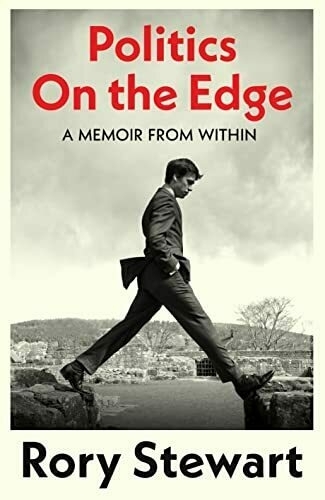📚 Finished reading Politics on the Edge by Rory Stewart.
This is Rory Stewart’s memoir of his time before, but mostly during, his time serving as a British member of parliament. That episode that commenced in 2010 when he was elected to serve as as part of the Conservative party.
He’s had a privileged upbringing which has turned him into something of a stereotypical British posh boy in presentation. Despite that though, he has somehow apparently remained a lot more sane, a lot more human-seeming, that most of his often-equally-as-privileged contemporaries have managed to do.
He identifies as a centrist, moderate, a one-nation Tory - who holds some more traditional small-c conservative views, including much respect for British traditions and institutions (political, royal or otherwise) and the notion of public service, in comparison to his culture-war-addled modern very unconservative Conservative contemporaries.
Since then, he’s stood for the leadership of the Conservative party - yes, he could have in theory been our prime minister - as well as, as an independent, the mayor of London. Neither of those two attempts worked out for him, but I do remember his famous strategy of asking his potential voters to let him come and stay the night at their homes.
Why stand as an independent? Well, in 2019 he was excommunicated from the Conservative party via the withdrawal of the whip for the crime of voting against what he saw as the first step towards a devastating no-deal Brexit.
Some of his fellow travelers had the whip restored in due time, but Rory in any case felt compelled to quit the party entirely given that the only alternative would mean he’d have to serve under Boris Johnson, a politician who ranks amongst the highest on his list of asinine dangerous fools that shouldn’t be allowed to be anywhere near the levers of power.
Nonetheless, his years of experience have allowed him to present to his readership a fascinating, albeit extremely depressing, insider’s look at how the wheels of British government turn in practice. This undoubtedly goes some way to explaining the current abject state of the country.
Most of his Parliamentary peers are shallow, tetchy, over-ambitious, confrontational, incompetent and ignorant. To be fair, the system seems designed to keep them that way, with ministers switching roles - he himself held 5 ministerial positions between 2015 and 2019 - and job titles so rapidly at whims of their leadership there’s no chance to actually build up any expertise and skill, even if they did care enough to do so. Besides, why bother learning anything when given the power of the leadership and the whips under the current system it’s very rare that politicians are even enabled to vote with their conscience? They do what they’re told by their leadership. Or they suffer.
He name names, tells personal anecdotes and exposes huge structural flaws within the system in a manner that suggests he’ll never be invited back to the Conservative party. Not that he shows no real signs of wanting to be, at least in its current state. Things got so bad at one point during his time serving that he had a moment where he no longer wanted to be alive. At moments he saw himself starting to behave, or thinking he needed to behave, in the same ways as his despised colleagues, leading to feelings of shame and self-loathing.
He’s particularly vicious about Boris Johnson’s immense variety of failings, and not all that much more impressed by Liz Truss. There’s a couple of politicians he seems to have retained some respect for - Theresa May and David Gauke - but of course even they have to battle against a system that appears designed to thwart their better-intentioned moves.
He retains a sense of humour. The book is laugh-out-loud funny at times, especially for folk like me who often find absurdity hilarious. But it’s one of those situations where it’s only funny until you remember it’s real. The dysfunctional system it describes is the same one that holds such tremendous power over you and your fellow citizens.
In that sense it’s also a very depressing book, infused with the author’s own despair and frustration. I don’t get the sense that Stewart really tries to give hope that there’s much redemption for the system beyond burning it all down and starting from scratch.
It’s not going to stop me voting in the forthcoming general election, and I very much hope it doesn’t stop you either - but I certainly understand the people who react to these stories with a sense of “what’s the point?” helplessness. But, as is almost always the case, whilst playing an active role may or may not improve the world, doing nothing is certainly not going to change anything.
